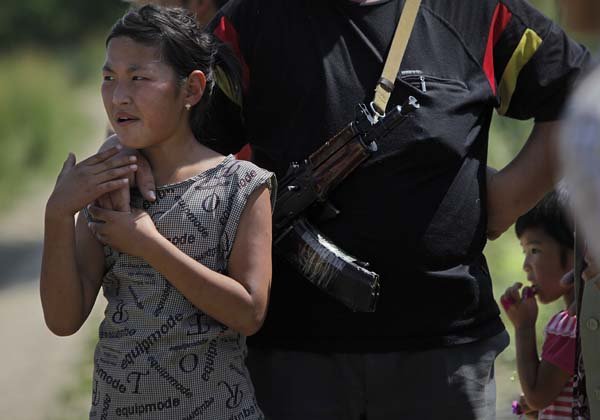NARIMAN, Kyrgyzstan — One after another, people came out of their houses in this village of ethnic Uzbeks to show how their passports, ID cards and driving licenses had been ripped to shreds or burned by Kyrgyz policemen.
Villagers said Wednesday that police beat and threatened them in a raid earlier this week, telling them they should leave Kyrgyzstan.
Hundreds of ethnic Uzbeks were killed and hundreds of thousands fled for their lives this month when mobs of ethnic Kyrgyz went on rampages across the south.
Without valid identification papers, people will be unable to vote in Sunday’s referendum on a new constitution, arousing suspicions that rogue elements among law-enforcement authorities are attempting to shut Uzbeks out of the country’s political process.
The United Nations, the United States and other Western nations have backed the referendum as a key step toward stability.
Kyrgyzstan’s interim government has blamed the violence on supporters of Kurmanbek Bakiyev, the former president who was deposed in April. The government accuses Bakiyev’s supporters of trying to derail the referendum, seen as a key step toward legitimizing the new leadership and turning the country into a parliamentary republic.
“We wanted to take part in the referendum, but we have no documents left,” said Yusupjon Ibrakhimov, as he displayed a pile of destroyed documents belonging to his family and neighbors that he said he reclaimed from a charred pile near his home in Nariman, a village on the outskirts of Osh, the country’s second-largest city where the ethnic rioting began on June 10.
Nariman residents say large groups of police officers swooped in on the village at dawn Monday, smashing windows and stripping people of their documents and valuables.
“They took our passports and phone, then they made me and my son lie down on the ground and hit us with their rifles and kicked us in front of my wife and my young children,” Ibrakhimov said.
The loss of passports holds an even more immediate and grave significance for some in this community, where, as in many places across this impoverished Central Asian nation, many working-age mengo abroad to earn hard cash to send back to their families.
“I just came here for a one month holiday the other day, and now I have no way of going back,” said Dilshadbek Saliyev, who works as a bus driver in the northern Russian city of St. Petersburg.
Like many typical Uzbek homes, the houses in Nariman are built around handsome courtyards festooned with grapevines and resplendent flower beds. Bowls heaving with ripe cherries that would have normally have been sold at the produce market, now burned to the ground, will likely go rotten, villagers said.
Smaller markets have gradually begun reappearing around Osh, a leafy and hilly city lying north of the snowy peaks of the surging Pamir Mountains.
Uzbeks have accused the mostly ethnic Kyrgyz military and police of collusion in deadly rampages, and raids in Uzbek neighborhoods in recent days have heightened their distrust of authorities.
Up to 400,000 ethnic Uzbeks, mostly women and children, have remained in camps and other locations on both sides of the Kyrgyz-Uzbek border, fearing to return to their homes.
The country’s Central Elections Commission said that six of its 126 officials in the south had been briefly kidnapped in Osh on Wednesday. It said there would be more details today.
Also Wednesday, the authorities organized a reconciliation meeting of Uzbek and Kyrgyz elders, where a top government official promised to quickly restore IDs lost in the conflict.
“Many have lost their passports, many of them were burned because of these sad events,” Bolot Junusov, deputy chairman of the Kyrgyz registration service, said at the reconciliation meeting of elders from the Osh region villages of Onadyr and Uzgur.
He said a special working group has been set up to speed the process of issuing new IDs, but admitted that it was unlikely that the government could issue all the necessary paperwork in time for Sunday’s referendum.
Information for this article was contributed by Leila Saralayeva of The Associated Press.
Front Section, Pages 6 on 06/24/2010
